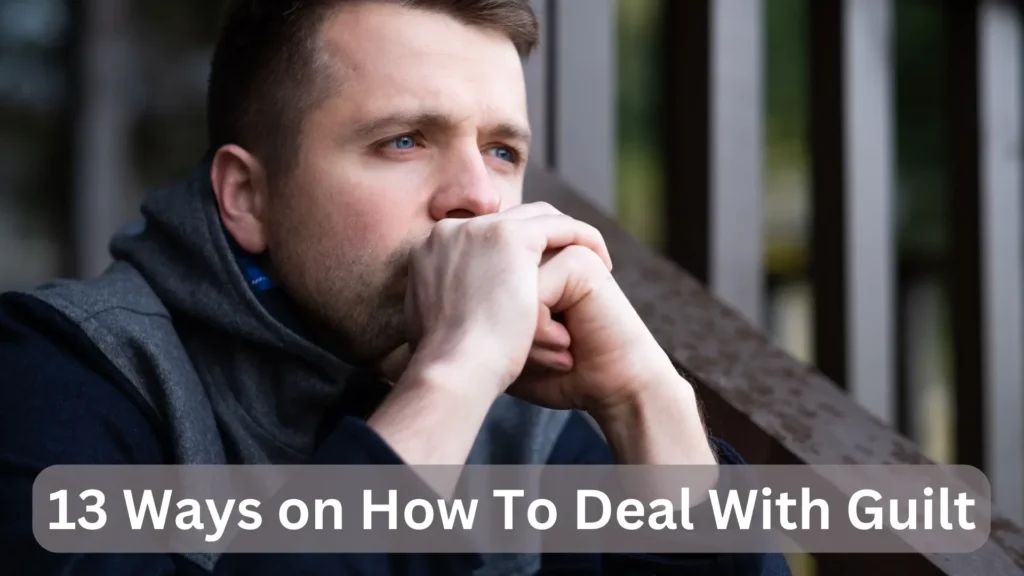How to deal with guilt: 13 Ways to deal with it!
Today, let’s talk about something we’ve all experienced at some point – guilt.
Whether it’s missing a critical goal in a game or letting down your team in a small way, guilt can be a tough opponent.
As a sports psychologist, I’ve seen firsthand how guilt can affect athletes at all levels.
So, let’s break it down, shall we?

What is Guilt?
Guilt is that nagging feeling of remorse or responsibility for something you’ve done or failed to do.
It’s like a referee in your mind blowing the whistle, signaling that you might have stepped out of line.
Remember, guilt is about your actions, not who you are as a person.
Guilt is like an internal coach that keeps you in check, ensuring you play by the rules of your own moral and ethical code.
Think of it as a natural response to actions that conflict with your personal values or the standards of your team or community.
It’s your conscience’s way of saying, “Hey, something’s not right here.”
In sports, guilt can show up in various ways.
Maybe you didn’t train as hard as you should have, or perhaps you lost your cool in a high-pressure moment.
Guilt is often the aftermath of these moments, reminding you of your commitment to your sport, team, and personal excellence.
It’s also important to distinguish guilt from regret.
While guilt focuses on your actions (like fouling an opponent), regret is more about wishing for a different outcome (like wishing you had won the game).
Both emotions are common in athletes but require different approaches to tackle.
There’s a thin line between healthy and unhealthy guilt.
Healthy guilt is constructive. It nudges you to correct your mistakes and improve.
It’s a motivator, pushing you to be better.
Unhealthy guilt, on the other hand, is when you beat yourself up excessively, blowing your actions out of proportion.
It’s like replaying a bad play over and over in your mind without learning from it.
In team sports, guilt can also be a social emotion.
You might feel guilty for letting your teammates down or not living up to the team’s expectations.
This guilt, though painful, can strengthen team bonds as it shows you care deeply about your role and contribution to the team.
For athletes in individual sports, guilt might revolve around personal goals and standards.
It’s a solitary game where you’re accountable to yourself, your coach, and your supporters.
Managing guilt here involves a deep understanding of your personal goals and values.
Guilt, in essence, is an emotional signal.
It’s a part of your psychological toolkit, helping you navigate the complex world of sports and personal integrity.
Like any aspect of mental training, understanding and managing guilt effectively can make you not just a better athlete, but a better person overall.
Remember, it’s not about never feeling guilty. It’s about using that feeling to grow stronger, both on and off the field.

Guilt vs. Shame: Know the Difference
People often mix up guilt and shame, but they’re not the same player on the field.
While guilt is feeling bad about something you’ve done, shame is feeling bad about who you are.
Guilt says, “I made a mistake,” whereas shame says, “I am a mistake.”
Big difference, right?
Guilt: “I Did Something Bad”
Guilt is about a specific behavior or action.
For example, an athlete might feel guilty for missing a crucial practice or not giving their best in a competition.
Guilt can also be constructive. It often motivates athletes to improve their behavior, enhance their performance, or make amends.
It’s like a coach pointing out a mistake to help you improve.
Guilt is often associated with empathy.
Athletes feeling guilty are more likely to consider the impact of their actions on others, like their teammates or coach.
Shame, on the other hand, hits deeper, targeting your sense of self.
An athlete who feels shame might internalize a failure as a reflection of their character, thinking, “I’m a bad player” instead of “I played badly today.”
Unlike guilt, shame is often destructive.
It can lead to feelings of worthlessness and defeat, hindering an athlete’s ability to bounce back or learn from mistakes.
Shame is heavily influenced by societal and cultural standards.
It involves a fear of disconnection or judgment from others.
For an athlete, shame might come from a perceived loss of respect or admiration from peers, coaches, or fans.
Understanding the difference is crucial for mental training in sports.
While guilt can lead to positive changes in behavior and improved performance, shame can be debilitating, leading to anxiety, withdrawal, and even depression.
Coaches and teammates play a vital role in how an athlete processes feelings of guilt or shame.
Encouraging a culture of constructive feedback and support helps in managing guilt positively.
On the other hand, a culture that stigmatizes failure or personal flaws can deepen feelings of shame.
Athletes are encouraged to engage in positive self-talk and reflection to differentiate between feeling guilty about a specific action and shaming themselves as individuals.
This helps in maintaining a healthy self-image and resilience in the face of setbacks.
Both guilt and shame are powerful emotions in the realm of sports.
However, the key lies in recognizing and addressing them appropriately.
While guilt can be a stepping stone to improvement, shame often needs a deeper, more compassionate approach to healing and recovery.
Understanding this difference is vital in the journey towards not just athletic excellence, but also personal well-being and team cohesion.
Can Guilt Ever Go Away?
Here’s the good news – guilt doesn’t have to be a life sentence.
Like a muscle that needs recovery after a big game, your emotions can heal too.
It’s about learning, growing, and moving forward.
Sometimes, guilt hangs around because it has something to teach us.
Once we learn the lesson, we can start to let it go.
First and foremost, it’s essential to understand that guilt is not a static emotion.
It’s a process, much like training or recovering from an injury.
Guilt can decrease in intensity and impact over time, especially when addressed constructively.
Just like physical wounds, emotional ones, including guilt, take time to heal.
The duration can vary depending on the nature of the action that caused the guilt and the individual’s capacity for self-forgiveness and personal growth.
Athletes are encouraged to reflect on their actions, understand the reasons behind them, and learn from their mistakes.
This understanding can gradually alleviate the sense of guilt.
Taking constructive steps to make amends or improve future behavior can significantly reduce feelings of guilt.
For instance, if an athlete feels guilty about underperforming, dedicating themselves to more rigorous training or helping teammates can alleviate these feelings.
Like physical training, emotional processing is key.
Talking with a coach, a sports psychologist, or teammates about feelings of guilt can help in processing and overcoming these emotions.
Practices like mindfulness and self-compassion exercises can be highly effective.
They help athletes to accept their feelings of guilt without being overwhelmed by them and move towards self-forgiveness.
Guilt can change over time.
An incident that seems unforgivable now might, with perspective and time, become a valuable lesson for future endeavors.
The context in which the guilt occurred and is addressed plays a significant role.
Supportive team environments, understanding coaches, and a positive personal support system can accelerate the process of moving past guilt.
In some cases, guilt might persist, especially if it’s tied to deeper issues or traumatic events.
This is where professional help from a sports psychologist or counselor becomes crucial.
It’s important to differentiate between normal feelings of guilt and chronic guilt, which can be a symptom of underlying mental health issues.
Guilt, in essence, can diminish and eventually go away, but it’s a journey.
It involves understanding, growth, and often a shift in perspective.
Athletes, with their inherent discipline and resilience, are well-equipped to navigate this journey.
With the right mindset and support, what starts as guilt can transform into a powerful source of learning and personal development.
Remember, in sports and life, sometimes the toughest challenges lead to the greatest victories.

How to Deal with Guilt – The Playbook
- Acknowledge It: Like spotting an injury, the first step is to acknowledge your guilt.
You can’t play through this one.
Start by fully acknowledging and accepting your guilt.
It’s like admitting an error in a game. You can’t fix what you don’t acknowledge.
Acceptance doesn’t mean agreement. It’s about recognizing your feelings as valid.
- Understand Why: Get to the root. Why do you feel guilty?
Was it a mistake, a bad call, or something else?
Understanding ‘why’ can help you address the core issue.
Dig deeper into the reasons behind your guilt.
Was it a lapse in judgment, a failure to meet your own standards, or something else?
Understanding the root cause is like analyzing a game tape to see where things went wrong.
- Apologize if Needed: If your actions hurt someone, a sincere apology can be a game-changer. It’s like resetting the play.
Don’t bottle it up.
Talk about your feelings with someone you trust, like a coach, a teammate, or a sports psychologist.
Verbalizing your guilt can provide new perspectives and relief.
- Learn from It: Every loss has a lesson.
What can this guilt teach you?
Maybe it’s about better decision-making or understanding your limits.
If your actions have impacted others, offer a sincere apology and make amends where possible.
This could be anything from a direct apology to taking steps to ensure the mistake isn’t repeated.
- Forgive Yourself: This might be the toughest part, but it’s crucial.
Show yourself some of the compassion you’d show a teammate in the same situation.
Use your experience of guilt as a learning opportunity.
What can it teach you about yourself, your values, or your approach to your sport?
Implement these lessons in future training and competitions.
- Move Forward: Guilt can keep you stuck in the past. Create a game plan to move forward. Focus on your next goals and strategies.
Practicing self-forgiveness is crucial.
Remind yourself that making mistakes doesn’t make you a bad athlete or person. It makes you human.
Learn to separate your actions from your self-worth.
- Seek Professional Guidance: If guilt is overwhelming or persistent, don’t hesitate to seek professional help.
A sports psychologist can provide strategies and tools to manage and overcome these feelings effectively.
- Develop a Resilience Mindset: Cultivate a mindset that views challenges, including guilt, as opportunities for growth.
Resilience training can be as important as physical training in sports.
- Focus on the Present and Future: Shift your focus from past actions to present opportunities.
Set new goals and work towards them.
Like in sports, what matters most is how you play the next game, not the last.
- Mindfulness and Relaxation Techniques: Incorporate mindfulness practices like meditation or yoga into your routine.
These techniques can help manage feelings of guilt and prevent them from escalating.
- Create a Support System: Build a support system with teammates, friends, and family.
Just as teamwork is crucial on the field, having a supportive network is key in dealing with emotional challenges.
- Journaling and Reflection: Maintain a journal to express and reflect on your feelings.
Writing can be a therapeutic way to process guilt and track your progress in overcoming it.
- Engage in Positive Activities: Engage in activities that boost your mood and self-esteem, whether it’s training, a hobby, or community service.
Positive actions can counterbalance feelings of guilt.
Remember, dealing with guilt is a process, not a one-time event.
It’s about continual growth, learning, and self-compassion.
As an athlete, you have the discipline and determination to navigate this process successfully.
Embrace these strategies as part of your mental and emotional training, and you’ll be well-equipped to tackle guilt both on and off the field.
Final Thoughts
Remember, feeling guilty is a part of being human, and it doesn’t make you a bad person or a bad athlete.
It’s all about how you handle it.
In the sports world, we’re constantly learning, adapting, and improving.
Dealing with guilt is no different.
Alright, team, as we round the bases on this talk about guilt, let’s remember a few key points.
Guilt, like a tough opponent, can be challenging, but it’s also an opportunity for growth, both on the field and in life.
The strategies we’ve discussed aren’t just plays for the game. They’re tools for life.
But hey, we all know it’s one thing to talk about strategies and another to put them into play.
That’s where the Success Stories Community comes in. This fantastic space is all about tailored help and support for achieving your goals. Whether you’re looking to up your game in sports, or aiming for a personal win, this community’s got your back.
Think of the Success Stories Community as your off-field team.
You’ll find folks from all walks of life, each with their own stories of tackling challenges, including guilt.
There’s nothing like hearing a “been there, done that” story to give you that extra boost of confidence.
Plus, the advice and support you’ll get are as personalized as a custom-fit jersey.
So whether you’re dealing with guilt from a fumbled play or just navigating the ups and downs of life, remember, you’re not alone.
There’s a whole team out there ready to support you, and it’s just a few clicks away in the Success Stories Community.
In the end, remember, being an athlete isn’t just about physical strength. It’s about mental resilience too.
Guilt, like any other emotion, is part of the game of life.
How you deal with it, learn from it, and bounce back, that’s what defines your true strength.
Keep your head up, stay focused on your goals, and don’t be afraid to lean on your community for that extra push.
And that’s the game plan! Stay strong, stay motivated, and let’s turn those guilt trips into victory laps!
So, lace up, take a deep breath, and get ready to tackle guilt head-on.
You’ve got this! 🏆



